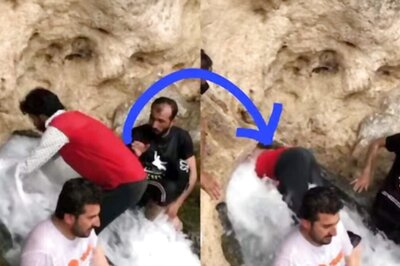
views
MYSORE: The festival of lights is celebrated by bursting crackers and distributing sweets. But, as the countdown for Deepavali festival starts, the Gumatapura village in Chamarajnagar district on Karnataka-Tamil Nadu border gears up for a unique celebration of Balipadyami smearing cow dung balls at each other.The villagers play with cow dung for more than two hours with a belief that the clothes and remains of a saint whcih were dumped in a pit took shape as ‘Linga’ surrounded by cow dung. The Gumatapura residents who believe cow dung is the most favourite of the local deity Kare Eshwaraswamy collect more than 10 trucks of dung and dump it behind the temple and separate into two parts. The Gore festival, a part of Deepavali celebrations, also punishes people lying by making them to sit on the donkey. On the day of the festival, the village headmen and children take out a procession to collect cow dung from people who own cattle. The villagers go to a nearby pond on the outskirts of the village and make a boy and a man with big mustache sit on the donkey. As the procession starts and heads towards the village, the local residents, as part of tradition, abuse the ghost like image siting on donkey to educate the younger generations that lying is a bad habit and should be discouraged.As the donkey reaches the Kare Eshwaraswamy temple premises , the villagers burn the effigy believing that it would end evil forces dividing society. As the fire goes up, the people in the procession were divided into two groups. They swing into action, throwing cow dung balls at each other for more than two hours. Later, they proceed and abuse the village headman before sharing sweets among the fellowmen.The villagers have celebrated Deepavali throwing cow dung on one another for centuries. It has become an entertainment event attracting people from both Karnataka and Tamil Nadu. Urbanisation and modernisation have added beauty to the festival by decorating the village and temple with lights, using tractors and trucks to dump dung instead of bullock carts. Mahadevaswamy, a teacher and a native of Gumatapura, said the festival has improved relationships and kept the villagers away from social evils.




















Comments
0 comment